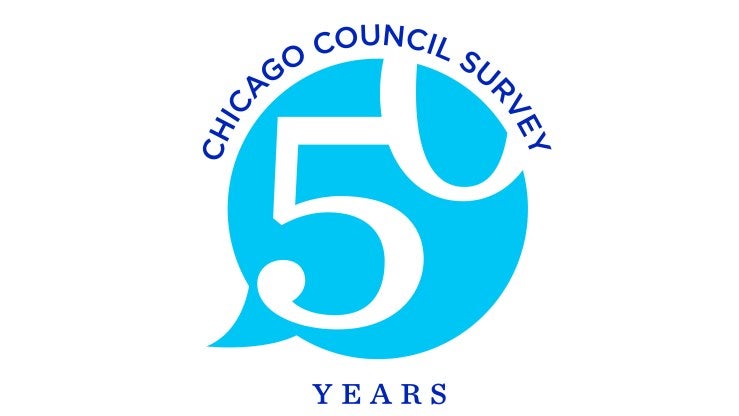Most Americans support sending additional aid to Ukraine and increasing sanctions on Russia, and relatively few want to withdraw support for Kyiv.
Earlier this month, Ukraine launched a major cross-border incursion into the western Russian region of Kursk, taking control of 74 Russian settlements in a bold move that set the Kremlin back on its heels. The surprise operation has dramatically shifted the dynamics of the war and given Ukraine its biggest battlefield gains since 2022. Russian President Vladimir Putin characterized the incursion as a proxy campaign initiated by Western countries, saying “the West is fighting us with the hands of the Ukrainians.” Moscow has since evacuated more than 132,000 Russians from the region and showered Ukraine’s forces with retaliatory missiles, airstrikes, and drone attacks.
Data from the 2024 Chicago Council Survey, fielded June 21–July 1, 2024, show that Americans believe a Russian victory over Ukraine would destabilize Western security. While a smaller majority of Americans continue to favor sending economic and military aid to Ukraine now than in earlier phases of the war, relatively few say the United States should withdraw all of its support for Ukraine.
Key Findings
- If Russia wins the war, most Americans believe it will likely have a negative impact on Western security (63% European, 52% US security). Majorities would also expect a mass migration of Ukrainians (83%), a military confrontation between Russia and NATO (70%), and a Chinese invasion of Taiwan (73%).
- Most Americans support increasing economic and diplomatic sanctions against Russia (69%) and sending additional economic (58%) and military (57%) aid to Ukraine.
- When provided three policy options, only a quarter of Americans (26%) say the United States should withdraw its support for Ukraine entirely, The remainder prefer to maintain current levels of support for Ukraine indefinitely (47%) or take a more activist approach and support the United States intervening militarily to quickly end the war in Ukraine’s favor (24%).
- While a narrow majority of Republicans now oppose continued US economic (51%) and military aid (51%) to Kyiv, only a third separately say the United States should withdraw aid to Ukraine entirely (33%). By contrast, majorities of Democrats and Independents support continuing US assistance, both militarily and economically .
- As in past surveys, nearly seven in 10 Americans (67%) oppose sending US troops to help Ukraine defend itself against Russia.
Americans See European Security at Stake in the War
In early July, President Joe Biden closed out the NATO summit by unveiling the Ukraine Compact, an initiative with signatories from more than 20 countries, the European Union, and the European Council to create “a unified and comprehensive security architecture to support Ukraine today and in the future.” As part of this broad security agreement, Biden also announced that he would be drawing down $225 million—from the $60 billion military aid package passed in April—to send Ukraine a Patriot missile air defense system, ammunition for its rocket and artillery systems, and other military equipment.
Americans consider the stakes in the Russia-Ukraine war high, especially for European security and the territorial integrity of European countries. Nearly two-thirds of Americans (63%) believe if Ukraine loses the war with Russia and is forced to concede part of its territory, European security will be negatively impacted. Specifically, a large majority (75%) think a victory over Ukraine will embolden Russia to take military action against Moldova, Georgia, or other former Soviet countries (see figure 2). Nearly as many (70%) say a military conflict between Russia and NATO allies in Europe is at least somewhat likely to occur should Russia succeed in its war with Ukraine.
While all partisans expect Western security and international standing to be negatively impacted by Ukraine losing the war against Russia, Democrats perceive the stakes as being higher than other partisans. Eight in 10 Democrats expect Russia to take military actions against former Soviet states (82%) or a military confrontation between Russia and NATO allies in Eastern Europe (78%); while Republicans and Independents also expect the same, they do so at a lower level (see figure 2 and appendix figure 1).
Half Also Predict Negative Impact on US Security and Standing
Half of Americans also say US security (51%) and international standing (49%) would be somewhat or very negatively impacted by Ukraine losing the war against Russia, while a third say it won’t have any impact at all (35% US standing in the world, 32% US security). These concerns are highest among Democrats, who are more likely than other partisans to believe US security and standing in the world are at risk if Russia wins the war (see figure 1).
As another consequence of potential Russian success on the battlefield, eight in 10 Americans (79%) think it is likely that the United States would deploy more US forces to bases in Europe. In addition, strong majorities across the board say it is likely that Russia will commit significant violence and human rights abuses against Ukrainian civilians (79% overall) resulting in a major migration of Ukrainian refugees to Europe and the United States (83% overall).1
Far beyond the United States and Europe, Americans also see broader implications of a Russian victory in its war with Ukraine: nearly three-quarters (73%) say it is likely China would follow Moscow’s example and invade Taiwan.
Little Change in American Support for Sending Aid to Ukraine over the Last Year
The Russia-Ukraine war is no longer as salient an issue as it once was to many Americans and as a result, their support for some policy options has waned since the start of the war. In the 2023 Chicago Council Survey, nearly seven in 10 (68%) said they were interested in news about the situation between Russia and Ukraine, down from 84 percent since the start of the war. Today, less than half of Americans (46%) say they are somewhat (33%) or very (13%) closely following news about the Russia-Ukraine war. Americans are also less likely to see Russia’s territorial ambitions as posing a critical threat to the vital interests of the United States. Five in 10 Americans (50%) now believe Russia’s territorial ambitions are a critical threat to US interests, down from 67 percent in March 2022.
Despite fewer Americans now following the situation in Ukraine, majorities continue to favor sending additional economic aid (58%) and military aid (57%) to Kyiv. Those who closely follow the situation in Ukraine are even more committed to sending economic (79%) and military assistance (78%) to Ukraine (see appendix table 2).
While the share of those endorsing continued assistance to Ukraine has shifted minimally over the last year, support for aiding Ukraine remains well below the initial highs of March 2022, at the outset of the conflict. That decline in support has occurred among all partisan groups, but most especially among Republicans. Between 2022 and 2023, Republican support for sending economic and military aid dropped by roughly 30 percentage points (27% decline in economic, 30% military). Today, the majority of Democrats (72% economic, 71% military) and Independents (57% economic, 54% military) continue to support sending aid to Ukraine, while only 45 percent of Republicans agree (51% oppose both forms of aid).
The decline in support for Ukraine since 2022 coincides with a shift in public views of foreign assistance as a means to achieving US foreign policy goals. When asked about the efficacy of various foreign policy tools, Americans now express less confidence in the ability of foreign assistance to realize US foreign policy goals than they did in 2022, at the start of the Russia-Ukraine war. Fewer now say that economic assistance (62%, down from 73% in 2022) and military aid (67%, down from 75%) are somewhat or very effective foreign policy tools. Americans are also more likely to say that economic (51%, up from 41% in 2020) and military aid (50%, up from 42% in 2022) to other nations should be cut back from the federal budget.
Americans Are Most Supportive of Increasing Russian Sanctions
In a unified effort to curtail Russia’s aggression in Ukraine, the United States, the European Union, and their allies have imposed myriad sanctions packages and export controls on Moscow. Although experts continue to debate the efficacy of such sanctions, the American public largely endorses them as an effective foreign policy tool and supports their use in Russia.
Fewer Americans now than in 2022 (63% down from 70%) say placing sanctions on other countries is an effective way to achieve US foreign policy goals. When asked about sanctioning Russia specifically, the majority of Americans across the board support imposing additional economic and diplomatic sanctions but at lower levels than in 2022 (69%, down from 80%). Across partisan lines, Democrats are the most likely to support expanding Russian sanctions (77%), but a substantial share of Republicans (66%) and Independents (63%) agree.
Majority Still Oppose Sending US Troops to Aid in Ukraine’s Defense
Like most Americans, President Biden has long opposed putting boots on the ground in Ukraine.2 Two-thirds of Americans (67%) continue to oppose sending US troops to help defend Ukraine, and majorities across partisan affiliations are of the same mind (73% Republican, 70% Independent, 61% Democrat). However, if Russia were to invade a NATO ally like Latvia, Lithuania, or Estonia, a slim majority would support deploying troops to help defend the Baltic states (54%). An even greater share of Americans would support the deployment of US troops if Russia were to invade a NATO ally like Germany (65%).
Americans Twice as Likely to Favor Indefinite Aid than Withdrawing Support
When it comes to US policy toward Ukraine, nearly half of Americans (47%) prefer to maintain the current level of US support for Ukraine indefinitely. A quarter of the overall public prefers that the United States and its NATO allies intervene militarily to end the war in favor of Ukraine as quickly as possible (24%), while another one in four (26%) say the United States should withdraw all US support for Ukraine. Those who closely follow news on the Russia-Ukraine war are more likely than others to prefer sending aid indefinitely (63% among those following the situation very closely; 57% among those following it somewhat closely; see appendix figure 3).
More than half of Democrats (56%) prefer to maintain the status quo, but a quarter (26%) say the United States should intervene militarily to end the war as quickly as possible. Republicans are closely divided between supporting Ukraine indefinitely (37%) and withdrawing US support entirely (33%). Like Democrats, Independents would much prefer to maintain the current level of support (46%). While a direct military intervention in Ukraine is the least favorable policy option for Republicans and Independents, withdrawing support entirely is the least preferred among Democrats.
Conclusion
If Russia wins the war, Americans across the board believe there will be immense geopolitical consequences. At the same time, they have grown less threatened by Russia’s territorial ambitions and are following the war in Europe less closely than they were at the outbreak of the invasion in 2022.
As US presidential campaigns are heating up and debates are forthcoming, candidates will be expected to outline their policy directions toward Kyiv and Moscow. Democrats remain committed to supporting US economic and military assistance to Ukraine, in addition to expanding sanctions against Russia. Republicans are far more selective when it comes to US-Ukraine policy options and clearly prefer imposing additional economic and diplomatic sanctions on Russia to providing concrete economic and military assistance.
- 1
In the 2023 Chicago Council Survey, fielded September 7–18, 2023, nearly seven in 10 Americans (69%) said they would support the United States accepting immigrants from Ukraine.
- 2
The Biden administration has more recently considered deploying American military contractors to help repair and maintain expensive equipment as an alternative to sending troops.
This analysis is based on data from the 2024 Chicago Council Survey of the American public on foreign policy, a project of the Lester Crown Center on US Foreign Policy. The 2024 Chicago Council Survey was conducted June 21–July 1, 2024, by Ipsos using its large-scale nationwide online research panel, KnowledgePanel, in English and Spanish among a weighted national sample of 2,106 adults 18 or older living in all 50 US states and the District of Columbia. The margin of sampling error for the full sample is ±2.3 percentage points, including a design effect of 1.1229. The margin of error is higher for partisan subgroups (±4.2 points for Republicans, ±3.9 points for Democrats, and ±3.8 points for Independents) or for partial-sample items.
Partisan identification is based on how respondents answered a standard partisan self-identification question: “Generally speaking, do you think of yourself as a Republican, a Democrat, an Independent, or what?”
The 2024 Chicago Council Survey is made possible by the generous support of the Crown family, the Korea Foundation, and the United States-Japan Foundation.





Related Content
 Public Opinion
Public Opinion
Results and analysis of the Council's annual survey of American views on foreign policy.
 Public Opinion
Public Opinion
Before the Crocus City Hall attack, a plurality of Russian young adults said Russia’s top foreign policy priority should be bolstering the country’s physical defenses.
 Public Opinion
Public Opinion
However, Republican support for providing US assistance continues to steadily decline.
 US Foreign Policy
US Foreign Policy
Republicans with a somewhat favorable or unfavorable view of the former president are more likely to say US assistance to Kyiv has been worth the cost.


